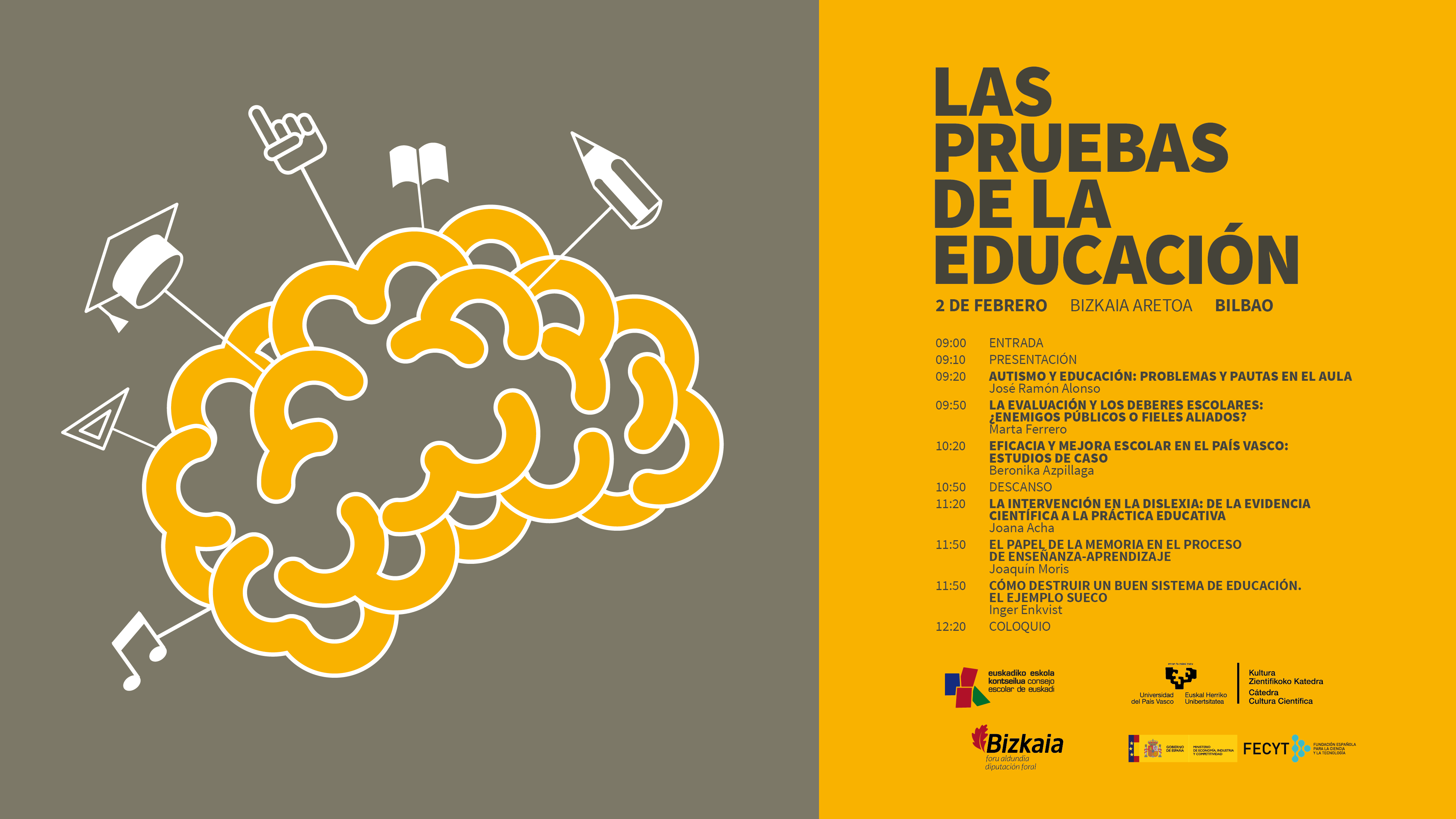Xehetasunak
Data eta ordua:
2 de February de 2018 / 09:00 – 13:30
Egoitza
How are some of the most common cognitive disorders dealt with in the classroom? Are the programmes and tools in the current education system effective? Do some of the most popular educational practices lack effectiveness?
These are some of the issues to be discussed at the “Education Testing” seminar which will be held on 2 February at the Bizkaia Aretoa in Bilbao. The event, which is held for the second time this year, is organised by the Chair of Scientific Culture of the UPV/EHU and the Basque Country School Board, with collaboration from the Spanish Foundation for Science and Technology (FECYT).
From 09:00 to 13:30 the day will include presentations by several experts who will expose multiple issues related to education, based on the existing scientific evidence. The specialists will place special emphasis on what is the best evidence available today with the objective of addressing the different realities that coexist in the classroom and in the education system in general.
“Education Testing” is part of a series of events organised by the Chair of Scientific Culture of the UPV/EHU to tackle everyday questions, such as education or art from various scientific perspectives. The seminar is run by the Doctor in Psychology Marta Ferrero.
Entry is free, but places are limited and an e-mail must be sent to the following address kzk.ehu@gmail.com, indicating your name, surnames and work centre.
Speakers:
The conference will consist of a series of presentations lasting between 20 and 30 minutes which will contrast the educational practices currently in use with scientific evidence.
The presentation titled “Autism and education: Problems and patterns in the classroom”, by José Ramón Alonso, Doctor in Biology and Professor of Cell Biology at the University of Salamanca, will discuss the concept of autism, its possible causes and the most common treatments with the aim of identifying specific guidelines that can help teachers deal with this cognitive disorder in the classroom.
Starting from the premise that there is a wide gap between research and educational practice, the Doctor in Psychology Marta Ferrero will address the details of strategies that have now become “public enemies” of the system: assessments and homework. Ferrero will explain based on scientific evidence how these educational practices, when used correctly, can constitute an important tool for teachers.
Beronika Azpillaga, associate Professor in the Department of Research and Diagnosis Methods in Education at the UPV/EHU will present the results of two research projects that have been developed in the Basque Country in the field of effectiveness and improvement for schools. Azpillaga will explain the results of the diagnostic assessment and the achievement levels obtained statistically in the studies, led by Professor Luis Lizasoain.
Joana Acha, a Professor in the Department of Basic Psychological Processes and their Development at the UPV/EHU will review the most effective prevention and intervention methods used to develop basic skills associated with dyslexia. The specialist in children’s cognitive processes will provide evidence of the changes to the brain that accompany acquiring such skills.
The Doctor in Psychology Joaquín Morís will discuss the role that memory has in teaching and learning processes. The expert will review some of the most important concepts related to the field of memory, and will analyse the evidence-based techniques that are derived from these concepts and how they can be applied to daily practice in the classroom.
The day will end with a talk by Inger Enkvist, Professor of Spanish Philology at the University of Lund, Sweden. The expert will bring the ins and outs of the Swedish education system closer to the locals of Bizkaia. Between 1962 and 1985 the Nordic country adopted a series of education laws that introduced what the British call “comprehensive school”, that is, a single option for all students from the age of 7 to 16.
In his presentation, Enkvist will mention the discussions prior to the first decision made in 1962, the protests, the difficulties and the consequences of imposing this school system for education in Sweden. Now, more than fifty years later, the expert will lay on the table the need for reform in order to cope with a new social situation.
The programme is completed with a final discussion in which attendees and speakers will share their different points of view and exchange questions and opinions.
Programme:
- 09:00 – 09:10 Access
- 09:10 – 9:20 Presentation
- 09:20 – 09:50 “Autism and education: Problems and patterns in the classroom”, José Ramón Alonso.
- 09:50 – 10:20 “Assessments and homework: Public enemies or faithful allies?”, Marta Ferrero.
- 10:20 – 10:50 “School effectiveness and improvement in the Basque Country: Case Studies”, Beronika Azpillaga.
- 10:50 – 11:20 Break
- 11:20 – 11:50 “Intervention for dyslexia: From scientific evidence to educational practice”, Joana Acha.
- 11:50 – 12:20 “The role of memory in the teaching-learning process”, Joaquin Moris.
- 12:20 – 12:50 “How to destroy a good education system. The Swedish example”, Inger Enkvist.
- 12:50 – 13:30 Closing Discussion

